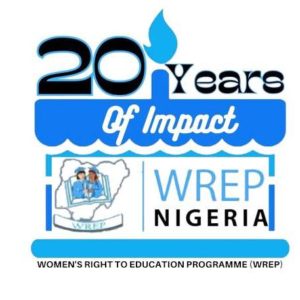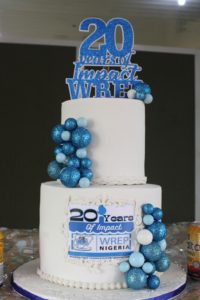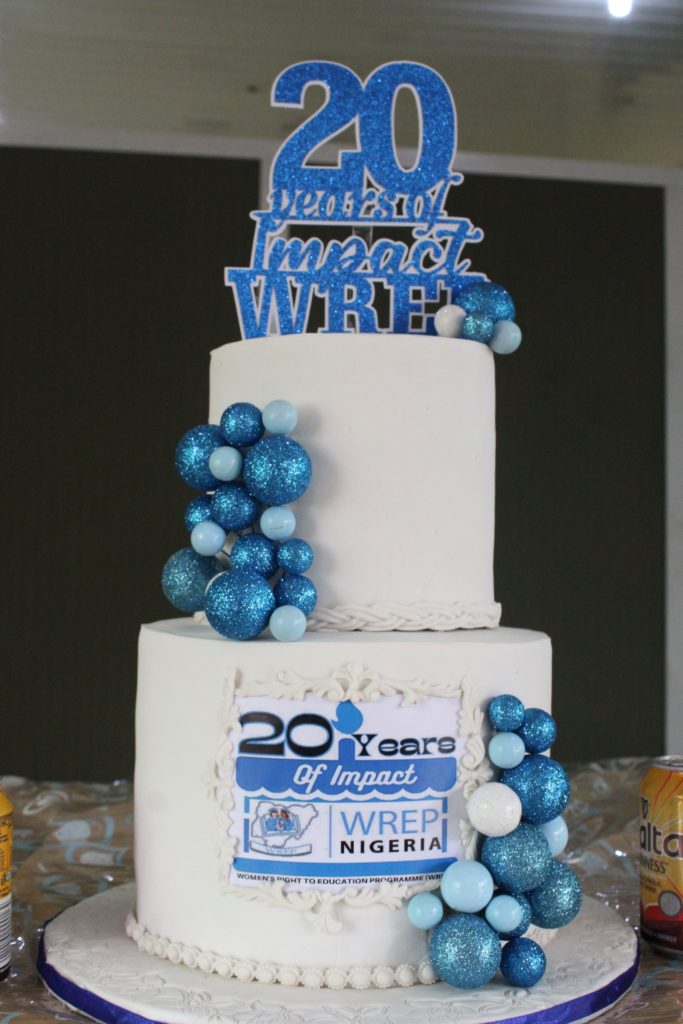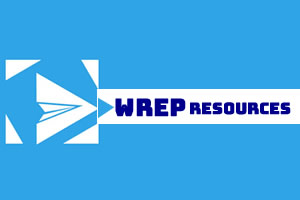
By WREP’s Communications Officer
In the last twenty-five years, Nigeria witnessed a significant progress in closing gender gaps in education. Thanks to both local and international non-governmental organisations who have been in the frontline despite security challenges, providing and advocating for resources to curb the excesses of the paucity of literacy especially in hard-to-reach rural communities. Among these frontliners is Nigeria’s women and girls’ right advocacy tink-tank; the Women’s Right to Education Programme (WREP).
With intentional moves complemented by highly skilled staff, led by a civil right mogul, Mimidoo Achakpa, WREP have in the last twenty years of its establishment built a reputation of a platform that rekindles hope for marginalised groups. Through mainstreaming Gender Equality and Social Inclusion (GESI) in all its programmes, WREP have successfully brought succours to under-privileged adolescent boys and girls, poor rural women and people living with disabilities (PWDs). Among the under-privileged groups who enjoyed the nourishment of WREP’s milk of human kindness is the girl-child. Girl-child education; an integral component of WREP’s target goals have become a buzzword among WREP’s staff, partners, funders and even volunteers who have accepted the act of advocating for the return of out of school women and young girls back to school as a collective responsibility. This drive has led to a massive increase in fresh and continuous enrolments which is evident in a UNESCO report (December 2021) tagged “Advancing Girls’ Education and Gender Equality through Digital Learning”, where it state that “Between 1995 and 2018, the percentage of countries with gender parity in education rose from 56 per cent to 65 per cent in primary, from 45 per cent to 51 per cent in lower secondary and from 13 per cent to 24 per cent in upper secondary education”. WREP’s contribution to this feat asserted by UNESCO is conspicuous across eight states of Nigeria comprising of Adamawa, Bauchi, Gombe, Taraba, Plateau, Niger, Yobe and the Federal Capital Territory.
Taraba
WREP got funding from T.Y Danjuma Foundation from 2014 to 2015 to implement a project on “Increasing the access of girl-child to quality education in Wukari and Takum LGAs in Taraba state, North East, Nigeria”. The project targeted at increased enrollment and retention of the girl child in schools as well as enhancing the educational situation of selected communities in the location. The project was implemented in Wukari and Takum local government areas in Taraba state. Among the activities under this project was Capacity building for teachers to enhance effective dissemination of knowledge to primary school pupils. Skills imparted include school record keeping, curriculum development, public speaking and books preservation. To enhance community participation and ownership of schools, the School Based Management Committees of both schools were also included in the trainings and established. Classrooms and headmasters’ offices were constructed and furniture supplied as well as exercise books, file jackets and jotters. Also, the Development Cooperation Ireland of the Irish Embassy in Abuja, provided funds for WREP to built a block of four classrooms in Igbogodo Community of Wukari local Government area of Taraba State. This community of over 500,000 residents had no presence of any form of primary education. This also was for the community children who could trek for up to 35klm to access any form of education. WREPs intervention helped in no small measure
Federal Capital Territory
With funding from the Embassy of Japan in Abuja, Nigeria, in 2011 WREP constructed Six classrooms, headmaster’s office and staff room with furniture, a borehole, four toilets (with emphasis on separate toilets for girls and boys) in Nomadic Primary School Kutunku1 in Gwagwalada Municipal area council. Purpose was to increase access of girl child enrolment especially amongs the nomads within the community and its environs.
Gombe, Bauchi, Adamawa and Yobe States.
With funding from the Student Tax Advocacy Initiative (STAI) in 2011, WREP implemented a project tagged “Establishment of Tax Clubs in Educational Institutions: Enlisting Students as Tax Advocates in the North East of – Gombe, Bauchi, Adamawa and Yobe States”. The aim of this project was educating students on the benefits of taxation to National development. A major outcome of the project was the training of trainers (TOT) of over 450 school facilitators and principals (across target states) on taxation and establishment of tax clubs in 40 schools reaching about 6000 students.
FCT, Plateau, Niger, Adamawa, Taraba and Kaduna States
WREP is an implementing partner of OANDO Foundation through stakeholder engagements, provision of infrastructure, (Construct and renovate adopted schools using community based renovation approach, implement WASH interventions, support installation of ICT centers and monitor students utilization in learning, implement the foundations Walk in Centre concept, and establish/upgrade early childhood care development centers; capacity building (training of SBMCs in adopted schools to identify and drive OOSC mobilisation and enrolment and provide support for overall school improvement; Teacher capacity assessment and training in adopted schools; support LGEA capacity assessment and training on Education Management information systems; LGEA staff in analysing multiple data on OOSC and identifying priorities); Scholarship- collation and validation of OOSC, conduct midline and end line surveys on adopted schools and communities in the FCT, Plateau, Niger, Adamawa, Taraba and Kaduna States.
Adamawa
Under-privilege girls in Adamawa also benefited from WREP’s “Inclusion of Life skills and Citizenship education in school plans through Girls for Girls (G4G) initiative in the Resilience Integrated Education Programming for Children in Northeast Nigeria. The project was funded by the United National Children Emergency Fund (UNICEF) and was implemented in Fofure Local Government Area of the state. A total of three thousand, three hundred and seventy-six (3,376) participated in the G4G group activities; this is because more girls showed interest to join the G4G groups in the project schools as a result of the various activities being carried out in the groups such as the G4G songs, vocational skills and life skills trainings. As part of the requirement for the G4G initiative, 121 out of 125 schools had their G4G groups established with support from the Education Secretary, Directors of Local Education Authority and some representatives from the State Universal Basic Education Board (SUBEB).

In conclusion, WREP’s intervention on girl-child education constitutes a ripple effect where all state and non-state relevant actors are involved. It’s a multi-sectoral approach that carries everyone along thereby paving way for very laudable and verifiable positive impact. Key stakeholders have attest to this fact. According to some of them whose communities benefited from the G4G, WREP is more like a “God Sent”. In their words;
According to Usman Hammatukur Daware Executive Council Chairman, Fofure LGA “Our secretariat complex was built by a woman despite having a lot of successful men. When a girl is educated it’s like educating the entire community and they turn out to be more supportive and concern about the community. Thank WREP, thank you UNICEF.”
Saidu Yusuf Is The Director, Personnel Management, Fofure LGA, he said “With the help of G4G Programme, number of enrolments of girls into schools have increased and the rate of early marriages have reduced tremendously”
Mrs Matina Henry is a Teacher and beneficiary of the G4G project, for her “The girls have learned many things from G4G which will help them in the future. The girls have learned to live healthily in their homes now and in the future when they are in their husband’s house; how to take care of the home and the children”
Mrs Tikar Musa is also a teacher and beneficiary of the G4G project, she said “The pupils learned hand works (vocational skills) through the G4G Programme. Examples include how to make to make morning fresh (liquid soap), baking cakes and lots more”
Samuel John WREP’s Project Manager of the G4G Programme “I will say that this reading competition has increased the level of commitment for the pupils and teachers as they are not used to competitions like this and also for the girls, it has increased their level of confidence and expectations from their teachers to make them perform better in the other coming competitions. These activities in general has brought about changes in the society in terms of educating the girl child. Now they community is aware of the importance of Education and educating the girl child in particular.”


